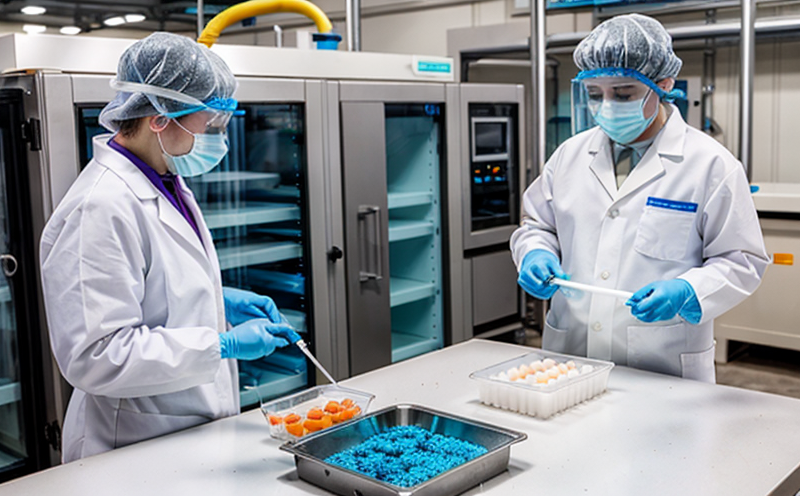ASTM E2721 Antimicrobial Testing on Plastic and Rubber Toys
The ASTM E2721 standard specifies a method for determining the effectiveness of antimicrobial treatments applied to plastic and rubber toys. This testing ensures that products meet strict safety standards, protecting children from harmful bacteria or fungi that might otherwise thrive in environments where frequent hand contact is common.
Plastic and rubber toys are frequently handled by children who may not have developed a full understanding of hygiene practices. Ensuring these items are safe to use is paramount. ASTM E2721 provides a standardized procedure for evaluating the antimicrobial properties, which guarantees consistency across testing labs worldwide. This ensures that manufacturers can rely on accurate results when assessing their products' safety and effectiveness.
The test involves exposing toys to specific microbial strains under controlled conditions. After exposure, the microbial load is measured before and after treatment. If the treated toy shows a significant reduction in microbial population compared to untreated controls, it passes the test. This robust evaluation process helps verify that the antimicrobial treatments are effective, thus enhancing product safety for children.
The ASTM E2721 method is widely recognized internationally, ensuring compliance with global standards and regulations. Manufacturers can confidently use this testing protocol as a key part of their quality assurance programs. By adhering to these rigorous guidelines, companies demonstrate their commitment to producing safe products that contribute positively to public health.
Why It Matters
The importance of ASTM E2721 antimicrobial testing on plastic and rubber toys cannot be overstated in today's world. Microbiological safety is a critical aspect of product design, especially when it comes to items that children frequently interact with. Toys are often exposed to various pathogens due to their frequent handling by young hands which can carry germs.
Children, particularly those under the age of five, are more susceptible to infections because their immune systems are still developing. Ensuring toys meet stringent microbiological safety standards helps reduce the risk of these children contracting illnesses or suffering from adverse health effects. By incorporating antimicrobial treatments that pass ASTM E2721 testing, manufacturers can offer products that contribute to a healthier environment for young users.
The test not only ensures microbial safety but also promotes long-term durability and performance of toys. Antimicrobial properties help prevent the growth of microorganisms on toy surfaces, which can lead to a longer product lifecycle without compromising its original quality or appearance. This is especially beneficial in ensuring that children's playtime remains enjoyable and hygienic.
Moreover, compliance with ASTM E2721 enhances brand reputation by demonstrating a commitment to safety and quality assurance. In today’s competitive market, companies that prioritize consumer health and well-being stand out positively among parents and regulatory bodies alike. By adhering to this standard, businesses can build trust and credibility in their products, which is invaluable for long-term success.
Why Choose This Test
- International Recognition: ASTM E2721 is globally accepted, ensuring consistent results across different regions.
- Rigorous Standard: The test evaluates the effectiveness of antimicrobial treatments applied to toys.
- Safety Assurance: Ensures that products are safe for children's frequent handling and use.
- Durability: Antimicrobial properties help maintain toy quality over time, enhancing their longevity.
- Compliance: Helps manufacturers meet regulatory requirements and industry standards.
- Reputation Building: Demonstrates a commitment to safety and quality assurance, boosting brand reputation.
- Patient Handling: The test mimics real-world conditions, providing accurate results for effective treatments.
International Acceptance and Recognition
The ASTM E2721 standard is recognized internationally by organizations such as the World Health Organization (WHO) and other leading health authorities. This widespread acceptance ensures that manufacturers can rely on consistent results regardless of where they operate or market their products.
By adhering to this standard, companies not only meet local regulations but also gain an edge in international markets. The global nature of ASTM E2721 helps foster trust among consumers who value transparency and reliability when it comes to product safety. This recognition extends beyond mere compliance; it sets a benchmark for excellence that competitors must strive to match.
The standard's international acceptance is crucial not only because it facilitates trade but also because it promotes best practices in toy manufacturing. As global health concerns evolve, so too do standards like ASTM E2721 which adapt to address new risks and challenges. By staying current with such standards, manufacturers ensure they are at the forefront of innovation and safety.
Moreover, compliance with ASTM E2721 can lead to improved product development processes. Manufacturers who follow this standard are better equipped to anticipate future regulatory changes and consumer expectations. This foresight allows them to stay ahead in an ever-changing market landscape while maintaining high standards of quality and safety.





